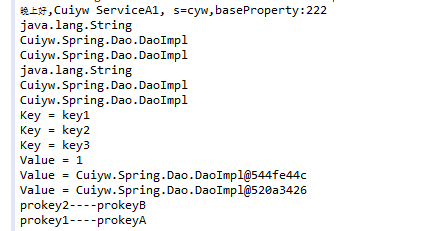这篇文章主要为大家展示了“Spring中bean基础知识的示例分析”,内容简而易懂,条理清晰,希望能够帮助大家解决疑惑,下面让小编带领大家一起研究并学习一下“Spring中bean基础知识的示例分析”这篇文章吧。
Bean:
在Spring技术中是基于组件的
最基本了是最常用的单元
其实实例保存在Spring的容器当中
Bean通常被定义在配置文件当中,Bean实例化由Spring的Ioc容器进行管理,Bean的实例可以通过Beanfactory进行访问,实际上大部分J2EE应用,Bean是通过ApplicationContext来访问的,ApplicationContext是BeanFactory的子接口,功能要比BeanFactory强大许多
在前面得博客依赖注入与控制反转中演示了应用spring实现ioc,在ApplicationContext.xml中有bean的配置,里面只是bean简单的应用。这篇主要是进一步学习使用bean。
一、定义
<?xml version="1.0" encoding="UTF-8"?>
<beans xmlns="http://www.springframework.org/schema/beans"
xmlns:xsi="http://www.w3.org/2001/XMLSchema-instance" xsi:schemaLocation="http://www.springframework.org/schema/beans
http://www.springframework.org/schema/beans/spring-beans.xsd">
<bean id="DaoImpl" class="Cuiyw.Spring.Dao.DaoImpl"></bean>
<bean id="ServiceImpl" class="Cuiyw.Spring.Service.ServiceImpl" scope="singleton">
<property name="dao" ref="DaoImpl"></property>
</bean>
</beans>上面的代码是之前博客配置的,可以看到bean的基本构成。 <beans/>是Sring配置文件的根节点,一个<beans/>节点里面可以有多个<bean>节点。在bean中常用两个属性:ID,Class. ID是一唯一标识,来确定是哪个bean,可以让其他bean中使用id引用。class用来指定是哪个class。同时还可以设置scope属性,scope有两种:singleton,non-singelton。singleton:单实例模式(默认,构造方法为private),整个Spring的容器中只有一个共享实例存在(singleton)。non-singelton:每次请求该bean,Spring容器都会新建立一个bean实例,然后返回给程序(request,session,prototype)。
二、创建
Bean的命名机制
id 当在Spring的窗口当中,查找某个Bean对象时,首先根据id进行查找,将其余作为Bean的默认名称,如果ID属性不存在,则根据Name属性进行查找(将其中的第一个名称作为默认的名称),如果ID和NAME都不存在根据类的名称进行查找。id---------->name--------------->类名。
Bean的别名:可以使用alias来为bean指定别名.
下面的配置文件还是在上面的xml基础上修改的。这里配置了ID为ServiceImpl的bean设置了别名。我们可以使用它的name、id、alias来获取service。
<?xml version="1.0" encoding="UTF-8"?>
<beans xmlns="http://www.springframework.org/schema/beans"
xmlns:xsi="http://www.w3.org/2001/XMLSchema-instance" xsi:schemaLocation="http://www.springframework.org/schema/beans
http://www.springframework.org/schema/beans/spring-beans.xsd">
<bean id="DaoImpl" class="Cuiyw.Spring.Dao.DaoImpl"></bean>
<bean id="ServiceImpl" class="Cuiyw.Spring.Service.ServiceImpl" scope="singleton" name="ServiceA">
<property name="dao" ref="DaoImpl"></property>
</bean>
<alias name="ServiceA" alias="ServiceA1"/>
</beans>package Cuiyw.SpringAop;
import org.springframework.beans.factory.BeanFactory;
import org.springframework.context.ApplicationContext;
import org.springframework.context.support.ClassPathXmlApplicationContext;
import Cuiyw.Spring.IService.IService;
public class App
{
public static void main( String[] args )
{
ApplicationContext context=new ClassPathXmlApplicationContext(new String[]{"ApplicationContext.xml"});
BeanFactory factory=context;
IService service=(IService)factory.getBean("ServiceA1");
service.service("Cuiyw ServiceA1");
service=(IService)factory.getBean("ServiceA");
service.service("Cuiyw ServiceA");
service=(IService)factory.getBean("ServiceImpl");
service.service("Cuiyw ServiceImpl");
}
}
三、注入
1.基本类型和string
可以使用value元素来设置,在上面的代码基础上稍作修改
<property name="baseProperty" value="222"></property>package Cuiyw.Spring.Service;
import Cuiyw.Spring.IDao.IDao;
import Cuiyw.Spring.IService.IService;
public class ServiceImpl implements IService{
private IDao dao;
private int baseProperty;
public IDao getDao() {
return dao;
}
public void setDao(IDao dao) {
this.dao = dao;
}
public void service(String name) {
System.out.println(dao.sayHello(name)+" baseProperty:"+getBaseProperty());
}
public int getBaseProperty() {
return baseProperty;
}
public void setBaseProperty(int baseProperty) {
this.baseProperty = baseProperty;
}
}
对于string类型,XML解析器以String类型解析出数据,如果属性不是String类型,属性值会通过PropertyEditors转换为其他类型,比如时间类型.
2.注入bean
上面的代码中就注入了bean,在ServiceImpl中注入DaoImpl。可以使用ref来进行配置。
3.注入集合
常见的集合有list、map、set、property等,下面的代码是在ServiceImpl中定义了几个属性,然后在上下文中通过属性注入进去。为了测试,在DaoImpl中也增加了一个属性s。
package Cuiyw.Spring.Dao;
import java.util.Calendar;
import Cuiyw.Spring.IDao.IDao;
public class DaoImpl implements IDao{
public String s;
public String getS() {
return s;
}
public void setS(String s) {
this.s = s;
}
public String sayHello(String name) {
int hour=Calendar.getInstance().get(Calendar.HOUR_OF_DAY);
if(hour<6) return "凌晨早,"+name;
if(hour<12)return "早上好,"+name;
if(hour<13)return "中午好,"+name;
if(hour<18)return "下午好,"+name;
return "晚上好,"+name+", s="+s;
}
}package Cuiyw.Spring.Service;
import java.util.Iterator;
import java.util.List;
import java.util.Map;
import java.util.Properties;
import java.util.Set;
import Cuiyw.Spring.IDao.IDao;
import Cuiyw.Spring.IService.IService;
public class ServiceImpl implements IService{
private IDao dao;
private int baseProperty;
private List<Object> lists;
private Set<Object> sets;
private Map<Object, Object> maps;
private Properties pros;
public IDao getDao() {
return dao;
}
public void setDao(IDao dao) {
this.dao = dao;
}
public void service(String name) {
System.out.println(dao.sayHello(name)+",baseProperty:"+getBaseProperty());
for(int i=0;i<lists.size();i++)
{
Object obj=lists.get(i);
System.out.println(obj.getClass().getName());
}
for(Object obj : sets)
{
System.out.println(obj.getClass().getName());
}
//遍历maps中的key
for (Object key : maps.keySet()) {
System.out.println("Key = " + key);
}
//遍历maps中的值
for (Object value : maps.values()) {
System.out.println("Value = " + value);
}
Set<String> pro=pros.stringPropertyNames();
Iterator<String> it=pro.iterator();
while(it.hasNext()){
Object key=it.next();
System.out.println(key+"----"+pros.getProperty((String) key));
}
}
public int getBaseProperty() {
return baseProperty;
}
public void setBaseProperty(int baseProperty) {
this.baseProperty = baseProperty;
}
public List<Object> getLists() {
return lists;
}
public void setLists(List<Object> lists) {
this.lists = lists;
}
public Set<Object> getSets() {
return sets;
}
public void setSets(Set<Object> sets) {
this.sets = sets;
}
public Map<Object, Object> getMaps() {
return maps;
}
public void setMaps(Map<Object, Object> maps) {
this.maps = maps;
}
public Properties getPros() {
return pros;
}
public void setPros(Properties pros) {
this.pros = pros;
}
}主要是注入的配置,在list、map、set属性中都是配置了一个基础类型value=1,两个DaoImpl类型。
<?xml version="1.0" encoding="UTF-8"?>
<beans xmlns="http://www.springframework.org/schema/beans"
xmlns:xsi="http://www.w3.org/2001/XMLSchema-instance" xsi:schemaLocation="http://www.springframework.org/schema/beans
http://www.springframework.org/schema/beans/spring-beans.xsd">
<bean id="DaoImpl" class="Cuiyw.Spring.Dao.DaoImpl">
<property name="s" value="cyw"></property>
</bean>
<bean id="ServiceImpl" class="Cuiyw.Spring.Service.ServiceImpl" scope="singleton" name="ServiceA">
<property name="dao" ref="DaoImpl"></property>
<property name="baseProperty" value="222"></property>
<property name="lists">
<list>
<value>1</value>
<ref bean="DaoImpl" />
<bean class="Cuiyw.Spring.Dao.DaoImpl">
<property name="s" value="cuiywlists" />
</bean>
</list>
</property>
<property name="sets">
<set>
<value>1</value>
<ref bean="DaoImpl" />
<bean class="Cuiyw.Spring.Dao.DaoImpl">
<property name="s" value="cuiywsets" />
</bean>
</set>
</property>
<property name="maps">
<map>
<entry key="key1" value="1"></entry>
<entry key="key2" value-ref="DaoImpl"></entry>
<entry key="key3" >
<bean class="Cuiyw.Spring.Dao.DaoImpl">
<property name="s" value="cuiywmaps" />
</bean>
</entry>
</map>
</property>
<property name="pros">
<props>
<prop key="prokey1">prokeyA</prop>
<prop key="prokey2">prokeyB</prop>
</props>
</property>
</bean>
<alias name="ServiceA" alias="ServiceA1"/>
</beans>执行main方法可以看到属性都注入进去了。

4.自定义属性编辑器
对于有一些属性是没法注入的,此时就需要自定义,比如上面说的日期类型。
首先是要定义一个继承PropertyEditorSupport的类,重写setAsText方法。
package Cuiyw.Spring.Service;
import java.beans.PropertyEditorSupport;
import java.text.ParseException;
import java.text.SimpleDateFormat;
public class CustomerProperty extends PropertyEditorSupport {
private String format="yyyy-MM-dd";
public String getFormat() {
return format;
}
public void setFormat(String format) {
this.format = format;
}
@Override
public void setAsText(String text) throws IllegalArgumentException {
// TODO Auto-generated method stub
SimpleDateFormat sdf=new SimpleDateFormat(format);
//super.setAsText(text);
try {
//转换对象,能过setValue方法重新赋值
this.setValue(sdf.parse(text));
} catch (ParseException e) {
e.printStackTrace();
}
}
}然后在配置文件配置这个类
<bean id="customEditorConfigurer" class="org.springframework.beans.factory.config.CustomEditorConfigurer">
<property name="customEditors">
<map>
<entry key="java.util.Date" value="Cuiyw.Spring.Service.CustomerProperty"/>
</map>
</property>
</bean>这里还是在ServiceImpl中增加了一个java.util.Date类型的date属性。并在配置文件注入值。
<property name="date" value="2017-12-10"/>以上是“Spring中bean基础知识的示例分析”这篇文章的所有内容,感谢各位的阅读!相信大家都有了一定的了解,希望分享的内容对大家有所帮助,如果还想学习更多知识,欢迎关注亿速云行业资讯频道!
亿速云「云服务器」,即开即用、新一代英特尔至强铂金CPU、三副本存储NVMe SSD云盘,价格低至29元/月。点击查看>>
免责声明:本站发布的内容(图片、视频和文字)以原创、转载和分享为主,文章观点不代表本网站立场,如果涉及侵权请联系站长邮箱:is@yisu.com进行举报,并提供相关证据,一经查实,将立刻删除涉嫌侵权内容。